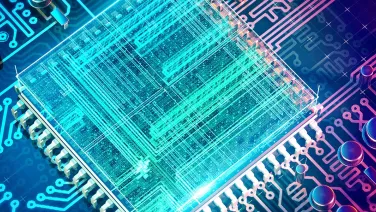Collaboration with Fujitsu signals ambitions for a quantum computer onsite at ANU
ANU has signed a Memorandum of Understanding with Fujitsu, bringing new opportunities for quantum computing research and teaching.
The agreement will see the two organisations partner to establish a centre for quantum research, with ambitions to build an onsite quantum computer.
“ANU is excited to see this collaboration with Fujitsu, which promises to build on the University’s strengths in quantum optical physics and quantum algorithms,” said Professor Lachlan Blackhall, ANU Deputy Vice-Chancellor (Research and Innovation).
“It will help to foster the growth of a talented pool of quantum computing professionals.”

As part of the collaboration, Fujitsu will provide ANU researchers and academics with access to Fujitsu’s quantum systems and simulators in Japan – including Fujitsu’s planned new facilities, a 256-qubit and 1,000-qubit superconducting quantum computer developed in the next two years with RIKEN, Japan's largest comprehensive research institution.
Beyond use of existing facilities, the agreement could also lead to collaborations in fundamental research in topics ranging from materials science, optical systems and Fujitsu’s Quantum-inspired Digital Annealer. (The Digital Annealer uses digital circuit design inspired by quantum phenomena, and focuses on rapidly solving complex combinatorial optimization problems without the added complications and costs typically associated with quantum computing methods.)
In turn, ANU will develop teaching and training modules based on access to Fujitsu’s quantum technologies to further inform the overall approach to research into quantum computing. As an example, this might contribute to the Master of Science in Quantum Technology https://programsandcourses.anu.edu.au/program/nscqt.
This partnership aligns with current research conducted in the Department of Quantum Science and Technology, in particular in the Quantum Optics group, (for example by Dr Aaron Tranter and Dr Jie Zhao) and Solid State Spectroscopy Group (Professor Matt Sellars and Dr Rose Ahlefeldt).
In the longer term, the development of an on-site quantum computer would support advanced research in fields such as cryptography, material science and quantum simulations, said Associate Professor James Sullivan, who led the Research of Physics’ involvement in the MOU.
“It will bring a lot of interesting opportunities – it will be a point from which we can build broader collaborations with industry, government, defence and more.”
“It jump-starts us; it’s a big step toward establishing us as a serious player in Australia, if not the world.”
This article was first published by ANU Research School of Physics.
There is scope to expand the collaboration more broadly to other areas, both within RSPhys and across the ANU. Interested parties should contact James Sullivan (james.sullivan@anu.edu.au) in the first instance.



